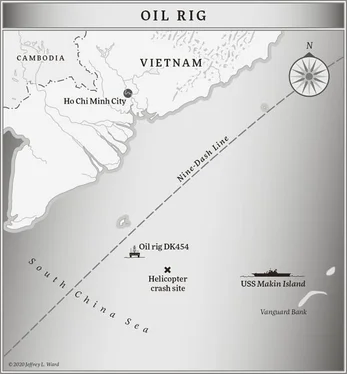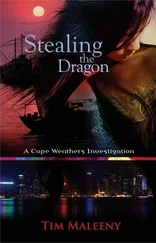Outside, voices barked orders in Mandarin. The van rolled forward a few feet. Medina heard the metallic whine as Ma rolled his window down. He chatted easily with the policemen, exchanging quick stories about the isolation of government work in Xinjiang, but how he was the kind of guy who liked isolation. He asked the men if they had water and offered to give them some, since he would be in the city soon.
Medina wished he wouldn’t wax so friendly at these stops. It took forever, and every second risked discovery.
The smell of cloves from Perhat’s mouthwash drifted over with the sounds of his breathing. He was a good man. In his mid-twenties, two or three years Medina’s junior, with the pronounced nose of his Turkic ancestors and a heavy brow overhanging dark eyes. Medina knew Perhat had a bit of a crush on her. They’d spent at least two of the last six hours lying alongside each other in the cramped hiding spot with gravel pinging off the thin metal between their backsides and the pavement. The highway was rough, often sending Perhat bouncing into Medina or her bouncing into Perhat. Their proximity made him self-conscious, and he’d asked Mamut to purchase the mouthwash when he’d stopped to buy petrol just before they turned east on the 312 for the final leg of their journey.
They rode in silence for ten minutes after the checkpoint, before another whistle from Mamut let them know it was safe to emerge.
The skyscrapers and glowing minarets of Urumqi materialized from the blackness just before midnight, with a frigid wind from the Heavenly Mountains buffeting the van and chasing away what little warmth the previous spring day might have left behind. There were police checkpoints in Urumqi as well. Bingtuan forces were on constant guard against ESS—events deemed to endanger State Security. The police were so busy keeping an eye on the Uyghur population in their city of three and a half million people that, more often than not, officers manning the checkpoints simply waved Han drivers through with an abrupt nod.
Mamut took a ring road around the downtown, taking side streets to bypass the Uyghur market bazaar.
Mamut nodded to the north, across the street from a tall hospital, as he worked his way between a river of honking scooters and green Volkswagen taxis.
“My mother used to bring me here as a boy,” he said, his voice hushed, as if they were passing a holy place. “See those shoddy new concrete apartment buildings, the bright lights of the state-owned convenience stores?”
Medina and Perhat stayed in the back of the van in case they needed to duck out of sight for a surprise checkpoint.
“Less than five years ago,” Mamut continued, “this place used to be a wonderful labyrinth of backstreets and alleys containing Uyghur cafés and shops—a place where my mother’s people could shop and talk about the old times. Now the only Uyghur shops and cafés are for Han tourists.”
“We’re getting close,” Perhat said, craning his neck so he could look out the windshield and better orient himself with the folded map on his knee. Mamut had a mobile phone, because he would be expected to have one for officers to check if asked. Neither Medina nor Perhat bothered. Mobile phones were far too easy to track, and there was no one for either of them to call anyway.
“Two blocks.”
Mamut brought the van to a stop in a small car park behind a large blue trash dumpster. A casual observer would think someone from the Ministry of Culture and Tourism was visiting a friend in the adjacent apartment building. Surveillance cameras lined the crossbeams of every light post like roosting pigeons, downloading massive amounts of data to Bingtuan security servers. Medina and Perhat wore traditional Uyghur costumes in bright colors. Heavy makeup changed the apparent angles of Medina’s nose, cheekbones, and chin. Perhat kept a tebetei pulled low over his brow. The traditional Kyrgyz fur hat was flashy enough that it said he was not trying to slip under the radar, but covered enough of his face to allow him to do just that. Mamut wore a black ball cap, pulled low, but walked with the confidence of a Han man with nothing to hide, just far enough ahead of the other two that it was impossible to tell they were together.
Half a block from where they’d parked the van, Mamut held up a hand, pausing to allow a knot of intoxicated men to move past them. Medina’s fingers closed around the butt of the suppressed pistol in her pocket. It felt cold and incredibly heavy as the men stumbled by. One in three people in western China worked for the Bingtuan security forces in one way or another. Drawing their ire could spell disaster, even when they were drunk and off-duty—perhaps especially then.
Mamut began to preach again as they walked, causing Perhat to glance at Medina and give her an ever-so-slight eye roll under the shadow of his fox-fur hat in the glow of the streetlight.
“At the sixtieth anniversary of the Bingtuan, a Party official spoke of the dangers to Xinjiang and said, ‘We must be ready to tightly clench our fists to combat the Three Evils—terrorism, separatism, and religious extremism.’ In no place are their fists clenched tighter than here in Urumqi, where this Bingtuan captain who calls himself Kenny Lo would take it upon himself to imprison a young father who did nothing but dare to teach his child to recite Uyghur folktales—and then pester that man’s wife while he was in prison until she felt compelled to take her own life. What these Bingtuan monsters do not realize is that a clenched fist is a slow fist. We will move with open hands, slapping and stabbing with lightning speed, causing far more damage than the dull and impotent blows of a tight fist.”
Mamut led the way down a dark alley, between two apartment buildings. Barracks for Te Jing—literally special police, the black-uniformed Bingtuan force equivalent to what the West called SWAT—were less than a block away.
A bitter wind kicked up a dusty whirlwind at the end of the alley, rattling the plastic bags overflowing from a long dumpster. Muffled snarls came from the shadows, a dog, guarding some prized piece of trash. The little group moved past quickly, showing they were no threat. As they passed the dumpster, the area behind the apartment buildings opened into a tree-covered courtyard. Spring hadn’t had time to green the lawns, but small amber lights on concrete posts formed to resemble ancient stone lanterns lit gravel walkways, bamboo gardens, and a brook that babbled over hauled-in rocks, courtesy of the pump that recirculated the captive water. It was all very bucolic at first glance, but the slightest bit of scrutiny revealed it was fake.
Medina nodded toward the glowing window through a copse of wrist-thick bamboo across a painted footbridge at the center of the courtyard. Clay tile and dragon carvings on the building’s wooden beams made Medina feel as if she’d stepped back into a more ancient China, but the colored lights of a television flashing inside against the paper blinds brought her back to the mission at hand. Medina slid a hand in her pocket again, reassured by the weight of the pistol.
A gaudy slurry of blaring music and studio gunfire spilled from under the wood-framed door.
Special Police Captain Lo Han, who had given himself the Westernized name of Kenny—was said to be an avid fan of video games and action movies—Westerns, gangster flicks, space operas, it did not matter. The bloodier the action, the better.
In that respect, Kenny Lo was about to get his wish.
Medina Tohti grieved for her family every minute of the day. Her husband was dead. She would never see her daughter again. Loneliness and despair pressed so hard at the back of her throat that she could hardly breathe. Food ceased to have any taste.
Читать дальше











![Александр Ирвин - Tom Clancy’s The Division 2. Фальшивый рассвет [litres]](/books/417744/aleksandr-irvin-tom-clancy-s-the-division-2-falsh-thumb.webp)
